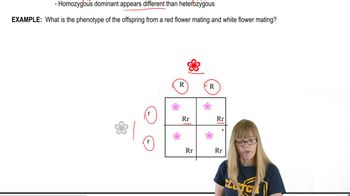Here are the essential concepts you must grasp in order to answer the question correctly.
Family History Assessment
Understanding the family history is crucial in genetic counseling, as it helps identify potential hereditary conditions. By gathering detailed information about the health of relatives, particularly those with known genetic disorders, counselors can assess the risk of passing on genetic diseases to future children. This step often involves constructing a pedigree to visualize inheritance patterns.
Recommended video:
Autosomal Dominant and Recessive Inheritance
Genetic conditions can be inherited in various patterns, with autosomal dominant and recessive being the most common. In autosomal dominant inheritance, only one copy of the mutated gene from an affected parent can cause the condition, while in autosomal recessive inheritance, two copies (one from each parent) are necessary. Understanding these patterns helps predict the likelihood of a child inheriting a genetic condition.
Recommended video:
Genetic Testing Options
Genetic testing can provide valuable information about the risk of inherited conditions. In this scenario, testing the woman for known mutations associated with her family's condition, if identified, can clarify her risk of being a carrier. Additionally, carrier screening for her partner may also be recommended to assess the combined risk for their future children.
Recommended video:





